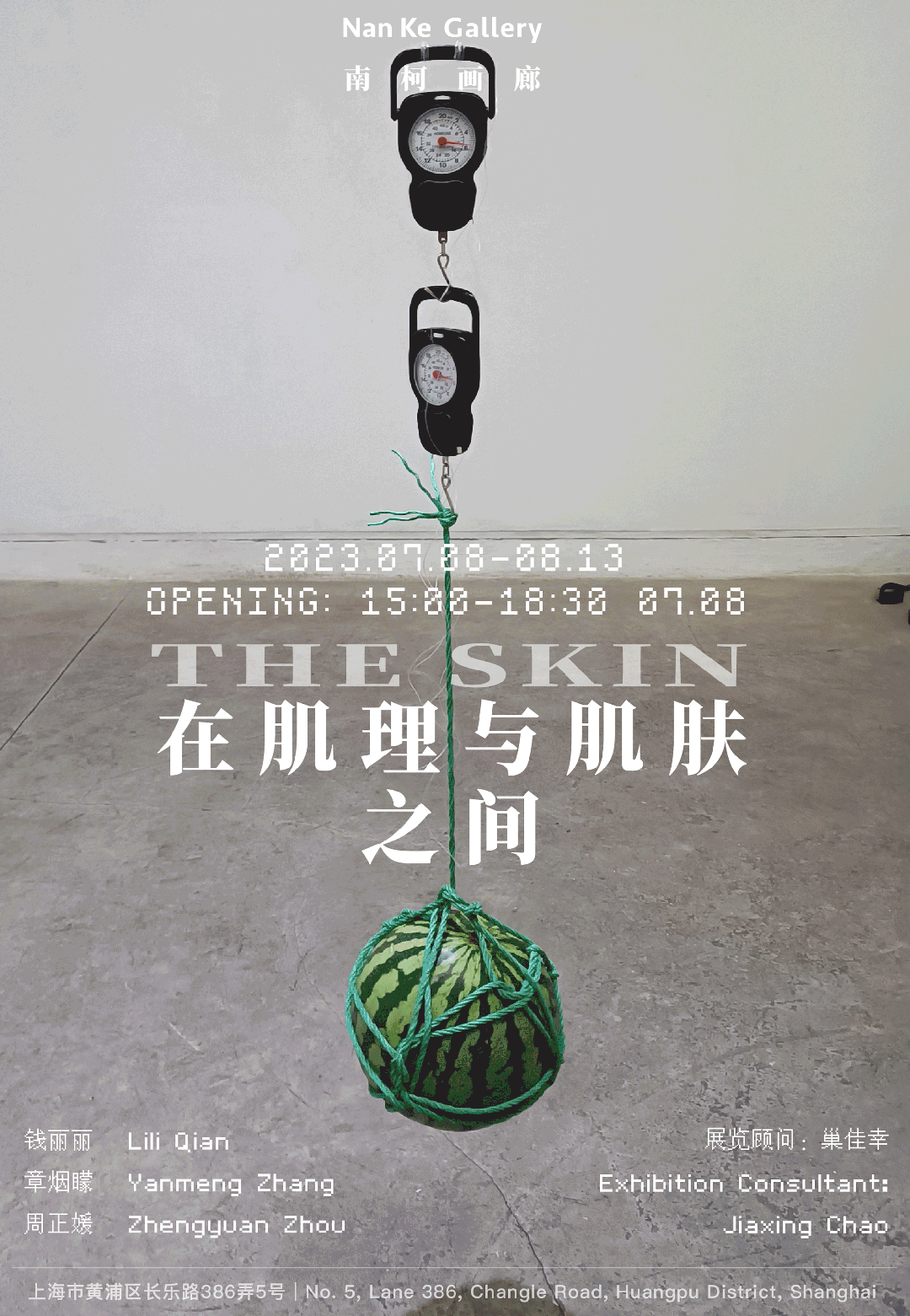Nan Ke Gallery is pleased to announce the group exhibition The Skin will be opened on July 8, 2023, including the works of Lili Qian, Yanmeng Zhang and Zhengyuan Zhou. The group exhibition brings together three artists who focus undoubtedly on how technological issues have subtle control over the human body in contemporary society at every micro level, and how that engenders alienation: whether the intervention of contemporary technology on eros, or the geological alienation of human skin, or the contextual re-grafting of everyday objects, such as watermelons, basketballs, and American pool balls.
At its start, the works from Yangmeng Zhang are from her series under the motif of Decaffeinated Love. Caffeine, known as a central nervous system stimulant, can drive away drowsiness and restore energy temporarily. Coffee, tea, soft drinks, and energy drinks with caffeine have been selling so well that Elon Musk once announced the purchase of Coca-Cola to add cocaine back into the drink. In a sense, this drink created and prevailed since the 19th century owes to several factors: high sugar, low cost, caffeine, and high advertising value; they contributed to the complete change in the meaning of drink for human beings, as desire usurped the place and became necessity. The figures in Zhang's paintings have polished, porcelain-like skin, recalling how the porcelain items exported in the last century were one of the most essential products in foreign trade, and how they were often used to portray celebrities and diplomatic figures. The porcelain figures embracing and kissing each other was the standard layout in the window of every home in the 80s and 90s. Here, the painting Endless Love is also a pair of figures in entanglement. The artist depicts a homosexual couple, one of which has an expressionless head that is cut away by the close-up shot, and isolated as if a still life painting, the empty expression points to its separation from other erotic signifiers: "Capitalism has accelerated the process of eroticization of society, by displaying everything as a commodity for all to see. These displays are useless except for sex. It vulgarizes love and turns it into pornography." In The Agony of Eros, Byung-Chul Han illustrates how, in a neoliberal society, primitive desires are eliminated and reproduced as pornography that can be circulated by capitalism. Man, Woman, and Blue shows bodies as if drawn on an iPad drawing board, while Daffodil presents plastic skin that has been transformed into still life in a similar way. In I Will Never Stop Loving You, organs and body parts that can be assembled like dolls are the keys to this configuration of eroticism, but it is also at the moment they are disembodied that they seem to struggle for the last dignity as eroticism being erased.
Also depicting body parts, Lili Qian's installation Deviation Damage shows an absurd torso juxtaposed in space–skinless, it is a figure/still life flung to the ground, with one of its legs replaced by a basketball. The juxtaposition clearly conjures theatricality. In the last two decades, the conception of theatricality gained more attention as an independent dimension and is being elaborated as a separate attribution outside theatrical texts. With the generalization of consumerist spectacle, theatricality has been re-proposed in this context, providing an entry point to explore the connections between themes in different times and places. In this exhibition, commonplace perceptions are taken out of their ordinary semantics. Watermelons, for example, are interesting everyday objects to Qian, and she challenges herself to take them out of their everyday semantics for defamiliarization; in the encounter with Zhang's paintings, time, space, and semantics are reconnected, generating double meanings of dislocation and absurdity. To take a recent example, the collaboration between the artist Yu Zhengda and Huang Hanming, Watermelon Sister, also notices the watermelon as the fruit/sphere and turns it into an absurd yet apropos vehicle for transgender expression. In terms of the symbolic nature of objects as images, in Araki Nobuyoshi's photography, watermelons being eaten became an established signifier of eros. At this moment, Qian’s Self-Weighing embodies the mutual relationship between watermelon and electronic scale claiming and losing subjectivity. No matter the billiards waiting to be hit in Secondary Benign Tumor, or the belly holding the blade in Flying Fork, are all collages that allow their subjects under different times and spaces to be reconfigured and reconnected in relatively absurd ways. The fact that billiards and basketballs are themselves in motion/rolling is emphasized repeatedly in this group exhibition, forming countless groups of relationships between gravity and rebound.
While located on the opposite side of each other, the textures of skins in Zhengyuan Zhou's photography Mother Land and Lili Qian’s Flying Fork are drastically different. The uneven belly with the knife, the mother's belly, the skin with stretch marks and aging lines, and the patchy hillside land–the exhibition attempts to form a set of correlatives. The skin on the mother's belly, gradually broke away from the dangerous and fragile, aging and unbearable, and evolved into the loess plateau–hard, lofty, dry, full of geographic textures. In turn, the bloody implication is detached between the imagery of the knife and the fish. Zhou extracts a frame from the very common memory of killing a fish and presents it to its audience as a landscape, montaging to strip and restructure time to retrieve empathy. In Apichatpong Weerasethaku's Memoria (2021), the young sound engineer Hernán says: “The sound you hear depends on the equipment of the sound." Zhou’s It's a particular kind of sounds suggests that the medium is the particular channel of sound reception she uses, while each person's perception chooses and shapes its medium.
In these senses, the dimensions between skins and textures are defined by the intertwining between the channels dominated by the new technology and the personal differences (memory, love).

